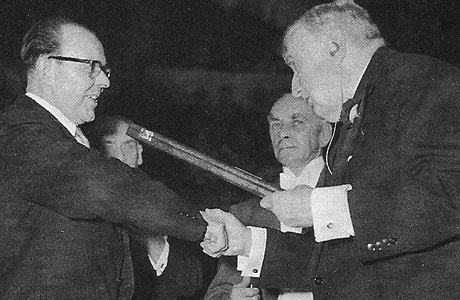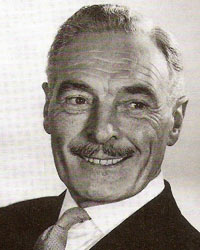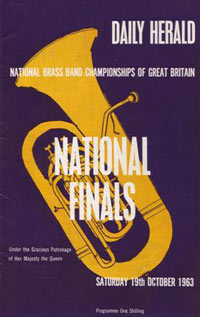4BR Time Team - The Daily Herald National Years
3-Feb-2009Tim Mutum looks back at the coverage given by The Daily Herald newspaper, one time owners of the Nationals, to the most famous of all brass band competitions. If only it was like this today...
The date is Saturday October 26th 1951. The Daily Herald lead story is the news that Mr Attlee has resigned his premiership following the general election, and Winston Churchill will form the new Government.
On page 2, Alfred Mackler reports that Brighouse and Rastrick is the only band competing in the Daily Herald National Brass Band Championships of Great Britain that has won through to all seven Finals since the contest resumed after World War 2.
There is a photo of Black Dyke Mills Band who, the previous day, gave a concert for 1000 workmen in Enfield. Ironically, they are photographed in front of a Fodens 'bus!
Epic Symphony
Elsewhere readers were informed that radio listeners were able to hear some of the performances of ‘An Epic Symphony’ during the afternoon's Home Service broadcast, followed by a radio commentary by Brian Johnston (who later found fame as one of the commentators on cricket’s Test Match Special) on the Light Programme. There was a third broadcast in the evening of part of the evening concert.

Vaughan Williams presents Stanley Boddington with his baton
10,000 people
The following year (1952) The Daily Herald reported with great excitement that the Empress Hall had been the venue for the Nationals and that 10,000 people attended the contest, with the same number returning for the evening concert.
Of significance were the guest soloists that night - Dennis Brain on French horn from the Philharmonia orchestra and George Eskdale on trumpet, and a member of the London Symphony Orchestra.
The Fairey Aviation Works Band won the contest - a band made up of five progress chasers, five clerks, four riveters, two inspectors, a welder, treatment operator, storekeeper, driver and works policeman.
Boot and shoe men
In 1955 Alfied Mackler breathlessly reported: 'Boot-and-shoe men beat the bands to win our trophy.'
It was the first ever victory for the Munn and Felton's Works Band conducted by Harry Mortimer. 7,000 people packed the Royal Albert Hall, amongst them three directors of Munn and Felton's.
They were 89 year-old George Felton, once a bandmaster himself, and his two sons Bert and Frederick Felton. With Ransome and Marles in runners up spot and Cresswell Colliery third, only CWS (Manchester) under Alex Mortimer represented the real strongholds of banding - not a Yorkshire outfit to be seen!
Within minutes of being declared winner Munn and Felton's were offered a television spot from ITV!
Modest Boddington
Two years later and Munn and Felton's won again. The Daily Herald referred to the 'modest' Stanley Boddington who received the Baton of Honour from the composer of the test piece Dr R Vaughan Williams in 1957 (above). In the Second Section it was reported that Dennis Masters, a 34- year-old wages clerk from Smethwick won with the Langley Band.
Most of page 7 of The Daily Herald of Monday October 26 1959 was devoted to the National Brass Band Championships.
 Black Dyke on top
Black Dyke on top
The banner headline was: 'Black Dyke is back on top'. There were photographs of the winning band, with a happy looking Maurice Murphy in the foreground, and 12-year-old David Willcocks with his father, Major George Willcocks (right), Black Dyke's conductor.
The young lad had no doubt as to whom would win, as on the Friday night he wrote a message and slipped it in his father's bed. It said, "Good luck tomorrow. Black Dyke shall win."
Black Dyke were indeed champions again, but as The Daily Herald reported: 'The audience of 10,000 and the six million televiewers who saw them win the Daily Herald National Brass Band Finals did not know how near these magnificent musicians came to not competing at all.'
Low in the water
He continued: 'A few minutes before bandmaster Jack Emmot went up to accept the silver trophy from Lord Citrine at the Albert Hall on Saturday he told me' (the 'me' refers to David Nathan, an alias for Edwin Vaughan Morris who compiled the report on the "big show"): 'The last few years have seen us in very low water. It was so bad that as recently as last Christmas the band was on the verge of breaking-up.'
Cornetist Owen Bottomley, who at the time was 57, and had been with the band since 1915, was quoted as saying: "We had a lot of old players and now we have the youngsters. They brought us to the top again."
The following year (1960) Alfred Mackler returned to provide coverage of the event.
Jubilent
Whilst the space devoted was much reduced, there was still room for a photo of the jubilant Munn and Felton's (Footwear) Band and a smaller shot of Sir Christopher Chancellor presenting the prize to winning conductor Stanley Boddington.
There were 8,000 in the audience, although I do wonder whether The Daily Herald was entering into some poetic licence with its audience figures. The Royal Albert Hall holds about 5,500 plus, in those days, there would have been the standing areas in the gallery but it seems unlikely this would accommodate 2,500 or in the case of 1959, 4,500!
Munn and Felton's (Footwear) Band included two players - Arthur Eathorne and Albert Garrett (both on bass) - who had been with the band since its formation 27 years earlier.
Its principal comet was John Berryman (a mere 20 years old) and the coach for the 'big test' was Harry Mortimer!
Interestingly, given the current argument on the early draw means you have no chance of winning, it is worth noting that Black Dyke, third to play (with bass player Wilfred Kershaw too ill to travel), came third, whereas Carlton Main Frickley Colliery playing 18t, were runners up. The winning band drew number 20.
Reduced coverage
Coverage of the contest was even further reduced in 1961, but there was still room enough for a striking photo of winners Black Dyke.
The real story that year was that the band missed rehearsals after its conductor, Major George Willcocks, and two bandsmen were involved in a car crash. Then, on the way to London for the Finals, the band's coach was involved in a crash, and many of the players had to borrow instruments, because their own were damaged. CWS (Manchester) were runners up, with Crossley Carpet Works in third place.
 Triumph for Mortimer
Triumph for Mortimer
The big story of 1962 was summed up in The Daily Herald headline of Monday 20th October 1962: "Triumph for the sit-down conductor.'
Alfred Mackler reported that a sick man left his bed to help the CWS (Manchester) Band win their first National title. That man, of course, was Alex Mortimer (then 57) who had not recovered from a bronchial attack and disobeyed doctor’s orders to conduct at the Royal Albert Hall.
When it was his band's turn to play he walked slowly on to the stage and sat down on a stool in front of the band (there is a lovely picture in the paper showing Alex conducting sitting on the stool).
It was of course one of the most memorable performances ever at a contest, and at the end with the applause ringing in his ears the exhausted Alex Mortimer was helped from the platform.
Not much changes
In 1963 CWS (Manchester) Band under Alex Mortimer retained their crown and The Daily Herald proclaimed: 'Champs are still top brass'.
Of interest though is the review by Richard Last (who later went on to become the TV critic of The Daily Telegraph) of the festival concerts. He thought the programme was rather less well chosen than it was for the previous year. He wrote: "Among 14 items there was not one original brass composition - more the pity since Sir Arthur Bliss, composer of this year's test piece, was in charge for the fourth time."
So, not much change since then!
Finale
1963 turned out to be the finale for The Daily Herald as the paper disappeared and The People newspaper became the owner/sponsors from 1964, although this was short lived.
As from 1966 Edwin Vaughan Morris took over the ownership of the National titles and continued to present the event himself before he too sold it after the 1971 contests. That, however, is another story.
Tim Mutum















